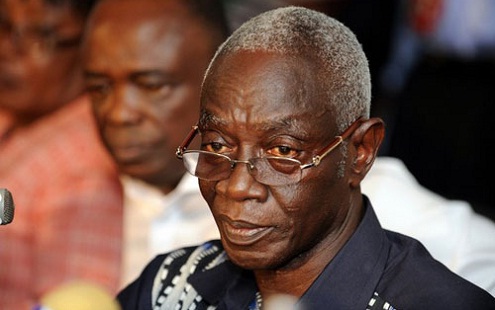A former Chairman of the Electoral Commission (EC), Dr Kwadwo Afari-Gyan, has urged election management bodies to “make haste slowly” with the introduction of election technology.
Dr Afari-Gyan, Ghana’s longest-serving electoral commissioner, said the electoral process should not be “technology-driven” but “technology-assisted”, thus the human resource capacity should be strengthened at all levels of the electoral process.
He was delivering the Keynote Address at a forum organised by the Political Science Department of the University of Ghana in Accra on Thursday.
It was on the topic: “Ghana’s experience with biometric register, biometric verification process and other electronic infrastructure.”
Dr Afari-Gyan said although technological tools had improved the country’s electoral processes, failure to properly integrate such technology could be counter-productive and undermine the integrity of the electoral process.
He said electoral managers must ensure that the technology being adopted suited the environment and must be well experimented in real situation before deployed in an election.
The existing electoral technology must also be firmly consolidated before new tools were introduced.
“As we seek to introduce the use of technology in an election, we must find ways to improve the human factor. We must build integrity into the electoral system itself to minimise errors,” he said.
Dr Afari-Gyan also urged the electoral management bodies to appreciate that improvement in an electoral system took time and could not be done all at once.
He also expressed concern over what he described as the irresponsible use of social media platforms to disseminate disinformation and hate speech.
These could have negative implications on election communication systems, he explained.
Dr Serebour Quaicoe, Director of Electoral Services at the Electoral Commission, said the country had made significant strides in its electoral processes over the years with the aid of technology.
Before 1995, the EC registered people from their homes until the polling station registration system was adopted.
The introduction of biometric verification devices had made it possible for the Commission to flash out impersonation and double registration, he explained.
Mr Peter Mac Manu, a former National Chairman and Campaign Manager of the New Patriotic Party, called for improvement in the collation and transmission of results at all levels.
He said the system should be upgraded such that results could be transmitted directly from the polling stations to the national collation centre.
“Citizens should have access to transmitted results to enhance transparency, ” Mr Manu said.
Dr Peter Boamah Otukonor, a former Deputy General Secretary, National Democratic Congress, said consensus must always be built before changes were made to the electoral system for effective implementation.
“Let’s look at our human resource and put integrity at the forefront,” he said.
Latest Stories
-
Gifty Anti inspires young women to rise above challenges at TAF College’s 2025 Freelancers launch
12 minutes -
Police restore calm in Adoagyiri after violent clashes between youth groups
20 minutes -
Obstructionist behaviour must not be tolerated – Prof Kwesi Aning warns
33 minutes -
Wontumi alleges intimidation and threats amid raid at his residence
34 minutes -
GREDA urges pricing discipline as cedi strengthens against dollar
36 minutes -
Ghana scales up fight against obstetric fistula with free surgeries in five hospitals
36 minutes -
“We step in when communities need us”- Agro Crown West Africa Director on borehole commissioning in Ofosu
37 minutes -
NUGS launches National Youth Festival 2025 with strong stakeholder support
37 minutes -
Adansi Rural Bank launches new product for artisans and MSMEs in its catchment
51 minutes -
My accounts were frozen without prior knowledge; I couldn’t pay my children’s fees – Wontumi
1 hour -
CEO of Margins ID Group highlights Ghana Card’s role in healthcare at ID4Africa Summit
1 hour -
2024/25 GPL: Accra Lions on the cusp of relegation after 3-1 loss to Hearts
2 hours -
GETFund warns public against fraudulent scholarship scams
2 hours -
Ivan Bruce-Cudjoe launches bid for GBA presidency, promises to reset Ghanaian boxing
2 hours -
If NPP doubts security services, they should go to court – Deputy Interior Minister
2 hours

